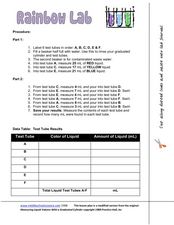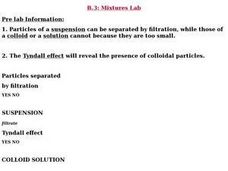Olomana School
Mixtures and Solutions: Paper Chromatography Experiment
Why does some ink bleed through paper, and other ink doesn't? Practice some paper chromatography to separate the colors from a pen with an interactive experiment for middle and high schoolers. Learners use a variety of solutions to track...
Curated OER
Recognition and Classification of Mixtures
Immerse your chemistry class in solutions! They melt and compare the mixtures that make up margarine, separate black ink into its component colors, distill ocean saltwater, and practice chromatography with plant pigments. There are eight...
Teach Engineering
Chromatography Lab
Groups use alcohol and chromatography paper to separate the color components of black ink. The purpose of the activity is to allow the class to become aware that mixtures exist in hidden places.
Curated OER
Using the Spectrophotometer to Analyze a Mixture
General chemistry classes practice spectroscopy. They grasp the relationships between wavelength, absorbance, and solution concentration. Additionally, they gain valuable practice using laboratory equipment such as burets and pipettes....
Curated OER
Rate of Solution Lab
In this rate of solution worksheet, students determine how quickly a solute dissolves in a solvent by testing one independent variable such as temperature, particle size or the amount of stirring. Students design their experiments and...
Curated OER
How Strong is the Solution
Students investigate the strength of solutions. For this scientific inquiry lesson plan, students examine various solutions of food color and water as they discover the concentration of the solutions by adding bleach to clear the color.
Curated OER
Word Problems: Mixture Problems
In this word problem worksheet, students read mixture problems and write equations to solve the problems. This two-page worksheet contains six problems, with answers.
Virginia Department of Education
Laboratory Safety and Skills
Avoiding lab safety rules will not give you super powers. The lesson opens with a demonstration of not following safety rules. Then, young chemists practice their lab safety while finding the mass of each item in a mixture and trying to...
It's About Time
Solutions, Suspensions, and Colloids
Chemists are frequently in suspension, but not because they misbehave! Scholars mix various items with water to create solutions, suspensions, and colloids. They test each one to determine their differences and properties. The resource...
Curated OER
Solution Shapes
In this solutions worksheet, students soak a pipe cleaner in hot water and a supersaturated solution of 20 Mule Team Borax. Kids leave their pipe cleaner in the solution for 30 minutes and then observe. They put it back in over night and...
Curated OER
Rainbow Lab
In this mixtures worksheet, students experiment with different amounts of solutes and solvents to make solutions. They observe color changes and look for chemical and physical changes in the test tubes. Students answer 5 questions and...
Curated OER
Mixtures
Sixth graders experiment with mixtures. For this chemistry lesson, 6th graders determine which mixtures are considered heterogeneous, a suspension, a solution or a colloid. Students create a data sheet of what they discover.
LABScI
Freezing Point Depression: Why Don’t Oceans Freeze?
Can you go ice fishing in the ocean? Learners examine the freezing point of different saltwater solutions. Each solution has a different concentration of salt. By comparing the freezing points graphically, they make conclusions about...
Curated OER
Lab: Percent of Composition of KClO3
Students find the percent of oxygen in potassium chlorate. In this percent composition lesson plan, students heat a solution of potassium chlorate using a catalyst, manganese dioxide, to decompose the potassium chlorate and release...
Curated OER
Solutions, Suspensions, and Colloids
In this solutions, suspension, and colloids worksheet, students answer questions as it relates to their reading information about solutions, suspensions, and colloids. Students observe different examples and complete a chart as they...
Curated OER
Solution Shapes
Eighth graders examine different solutions. In this solution material lesson students complete a lab activity and several worksheets.
Teach Engineering
Surface Tension Lab
What constitutes a good soap bubble? In the second installment of a nine-part series, scholars apply their understanding of surface tension to soap bubbles. They experiment to determine the best solutions to use for the...
Curated OER
Solutions, Suspensions, & Colloids Lab
In this solutions, suspension and colloid worksheet, students complete a lab experiment in order to determine if a given mixture is a solution, suspension or colloid. They are given six vials and they record their observations of each...
Curated OER
Mixtures Lab
Students classify different mixtures. For this mixtures lesson plan, students determine samples to be suspensions, colloids, or solutions and compare homogeneous and heterogeneous mixtures.
Curated OER
Parts-Per-Million Concentration Lab
Students develop a comprehension of parts per million as a concept. They work in teams to create successive dilutions of a solution to reach a parts-per-million concentration. Students list what they think the atmosphere is made of. They...
Curated OER
Separation of a Complex Mixture
Students develop a method to separate different types of mixtures. In this chemistry activity, students model the steps in the scientific method. They perform the experiment and analyze data.
Curated OER
Programming the "Rinse Robot"
Experienced chemistry technicians use then layer chromatography to discover how much of a free compound is left after each rinse cycle. Where this could obviously be used as a practice with chromatography technique, it can also be used...
Cornell University
Chemical Reactions
Investigate the Law of Conservation of Mass through a lab exploration. Individuals combine materials to initiate chemical reactions. They monitor for signs of reactions and measure the masses before and after the reactions for comparison.
Concord Consortium
Protein Folding
Long strings of amino acids fold themselves into stable peptides. The simulation allows scholars to observe the process in multiple ways. Using hydrophobic, hydrophilic, or a combination of proteins in three different solutions, the...

























